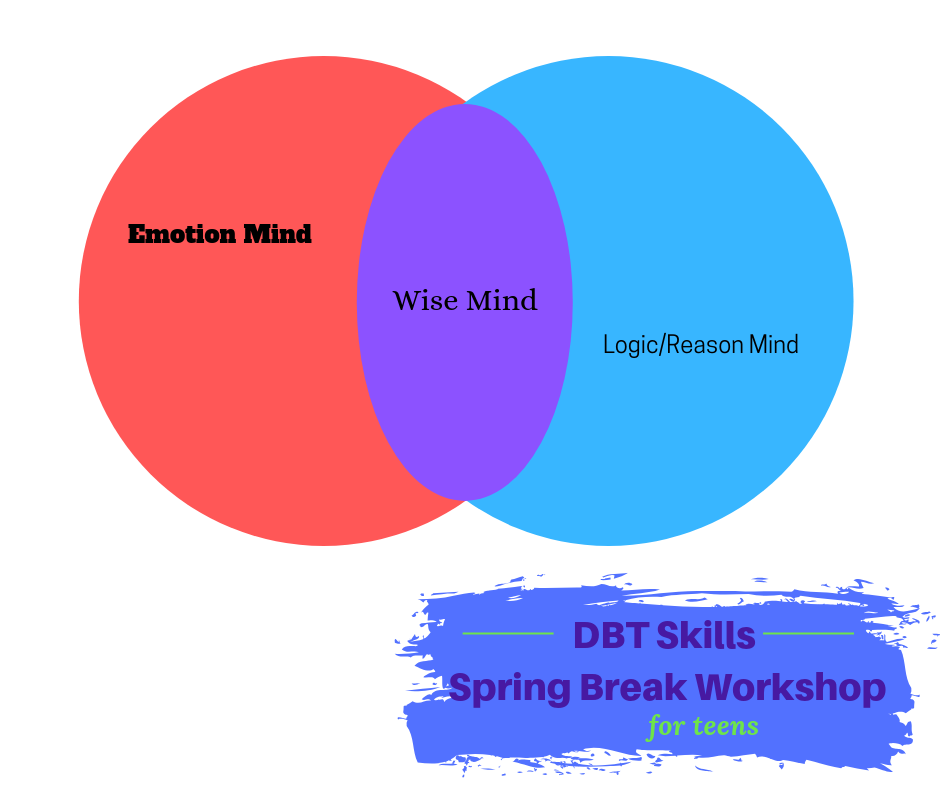In DBT we learn that which state of mind we’re in has a big impact on what we experience and the decisions that we make. Each state of mind has its own purpose, but not every state of mind allows us to flourish when it comes to decision making.
How Can DBT Help Your Teen?
DBT stands for dialectical behavioral therapy; it’s a form of talk therapy that is based on cognitive behavioral therapy, but adapted for those who experience emotions at a more intense rate than those around them–which can make it a wonderful option for teens who are managing such intense emotions through their development.
DBT Skills: Helping Your Teen Make Healthier Choices
I’m sure we are all aware of how big emotions can get for teens.
“OMG! I hate my math teacher! I’m never going to her class again!”
“There’s no way I can possibly go to school tomorrow knowing how anxious I am!”
“How could she do this to me?! I’m so angry I could break something!”
The things is… these emotions are valid. Your teen is allowed to feel that way. AND what most teens don’t know is that they can feel those feelings and not act based on them.
DBT says that States of Mind are our outlooks or perspectives on different situations. What State of Mind we are in has a big impact on what we experience and the decisions that we make. DBT teaches us that we have three States of Mind: Emotion Mind, Logic or Reason Mind, and Wise Mind.
When we are in Emotion Mind, we are focused on and driven by our emotions. This means that our feelings are driving the car, not us! In Emotion Mind, we aren’t focusing on facts but instead focusing on feelings. Here are some examples of Emotion Mind:
- Ripping up a test after getting a disappointing grade
- Getting into a screaming match during a disagreement
- Engaging in self harming or self destructive behaviors based on anxiety or depression
Logic or Reason Mind is the opposite of Emotion Mind – here we are solely focused on being logical and what we can prove, not on how we feel. Here are some examples of Logic or Reason Mind:
- Baking or following a recipe
- Counting
- Reading a book
Finally, Wise Mind is the combination of both Emotion and Logic Minds. This is the ideal – the space we want to be where we can feel our feelings AND focus on the facts. We are most effective here because we can validate our emotions and not necessarily act just on them. The beauty is in the balance – balancing what we feel and what we know. Here are some examples of Wise Mind:
- Studying for a test before watching TV
- Using DBT skills instead of making an unhealthy or unsafe choice
- Taking a break from a fight, calming down, and then revisiting what happened
It’s normal for each of us to spend time in each of these States of Mind. Being aware of what State of Mind we are in greatly helps us determine how to be effective and healthy. If your teen is aware that they are in Emotion Mind, they are better able to both learn and use their skills to bring themselves into Wise Mind; thus creating a space where your teen can feel empowered knowing their feelings are valid AND knowing they can still be healthy and safe.
Think your teen could benefit from understanding States of Mind to better manage their emotional overwhelm and make healthier choices? Your teen will learn all about this and the other DBT skills in our weekly teen DBT Skills Training group. Click the button below to learn more and get more DBT-based parenting tips.

